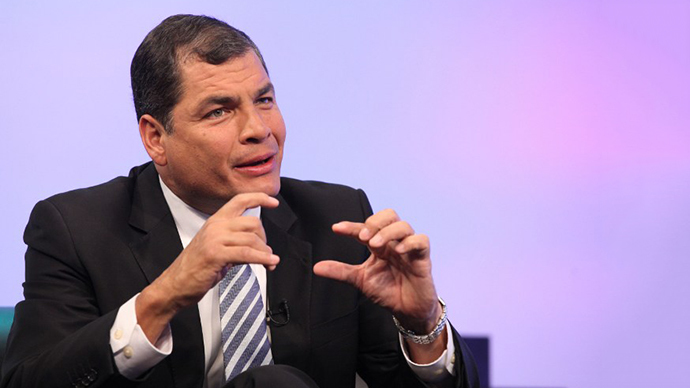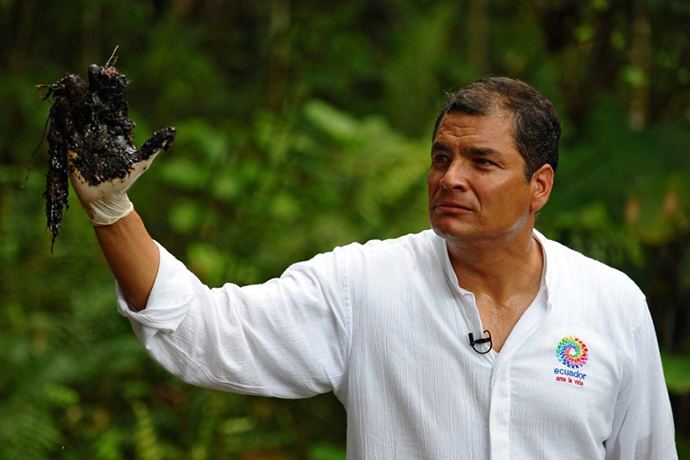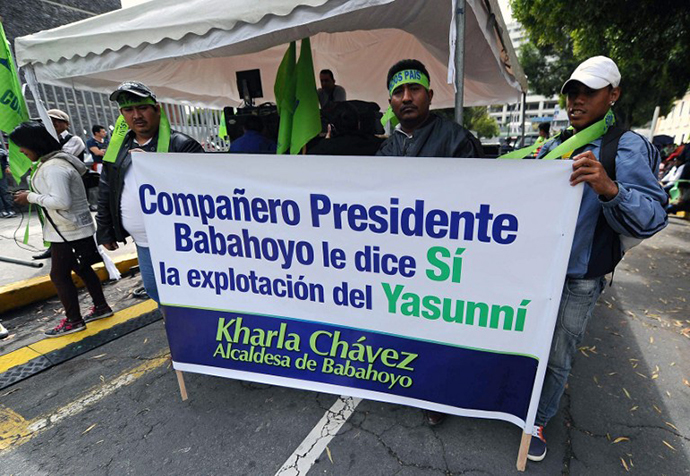Here is the Chevron legal case and Yasuni portion of an interview with President Correa by RT.com
 Ecuadorean President Rafael Correa (AFP Photo / Eduardo Santillan Trujillo)
Ecuadorean President Rafael Correa (AFP Photo / Eduardo Santillan Trujillo) Ecuadorean President Rafael Correa shows his oil-covered hand at Aguarico 4 oil well in Aguarico, Ecuador on September 17, 2013. (AFP Photo / Rodrigo Buendia)
Ecuadorean President Rafael Correa shows his oil-covered hand at Aguarico 4 oil well in Aguarico, Ecuador on September 17, 2013. (AFP Photo / Rodrigo Buendia)Texaco’s fault is evident and impossible to cover up, but Chevron executives apparently have no conscience. In fact, the rainforest communities initially wanted their lawsuit against the company to be decided by a New York court, so Chevron spent 10 years arguing that an Ecuadorean court had enough competence to hear this case. They were hoping to buy the court in Ecuador, but they couldn’t, and the Ecuadorean court found them guilty. So Chevron turned around and started arguing exactly the opposite.
But that is not all of it. Chevron lost a class action lawsuit and appealed it in the Permanent Court of Arbitration in The Hague. They insist that Ecuador must itself finance the indemnities awarded to the plaintiffs, citing an agreement signed in 1998 by Texaco and Ecuador’s former government. In that agreement, the corrupt officials who ran Ecuador at the time conceded that Texaco’s clean-up operations had been sufficient, and absolved the company of any further responsibility. However, the Ecuadorean Treasury debunked Texaco’s clean-up as a sham in 2000, way before I became president. But the damage was already done: since Ecuador’s corrupt previous government has renounced any further claims by way of an international treaty, we as a state can no longer sue the company.
However, that doesn’t bar individual plaintiffs from filing their lawsuits, nor can the Ecuadorean government ban its citizens from suing a company. So a number of Amazon indigenous communities sued Texaco, and were awarded damages by an Ecuadorean court. And now Chevron is appealing to the Permanent Court of Arbitration, arguing that Ecuador should pay the bills.
There is more to it. Chevron’s suit in the PCA relies on a Bilateral Investment Treaty between Ecuador and the US, which entered into force in 1997. But Texaco closed its operations in Ecuador back in 1992. That means that Chevron is trying to invoke an agreement in respect of a case that dates back longer then the treaty itself. Like I said, those people have no scruples. If a public body were to use similar tricks, it would have been penalized for improper conduct.
And there is still more to it. The agreement they cite concerns the relations between a government and a company, whereas the court decision that awarded damage to the rainforest communities was based on a class action lawsuit filed by individuals. It lies outside the scope of that agreement. Despite this fact, The Hague arbitration panel deemed itself competent to review the decision of the Ecuadorean court. And the first thing they did was urge our government to revoke the court decision, as if they didn’t even consider Ecuador a democratic state governed by the rule of law, where the judiciary is independent of the government.
Besides, by proclaiming itself competent to review the decision of the court in Lago Agrio, The Hague panel effectively made itself eligible to collect a $300,000 litigation fee paid by a defendant government. So there is a conflict of interest, unfair litigation, and outright corruption. They have passed a judgment in bad faith so as to grant Chevron impunity and make Ecuador pay for the damage that had been done to us. The whole world should know about this. This is an evident example of how multinational corporations deliberately seek to put themselves above the law and escape responsibility, using their money and influence, their lobby groups and their lapdog judiciary.
RT: An RT crew has also visited Lago Agrio and produced a documentary on the Chevron controversy, titled A Tainted Land. It is accessible at the RT Spanish website.
RC: Such things are impossible to hide. You can go and talk to the local residents of the rainforests. You can go to any place where Chevron - Texaco at that time - was working and you will see the rubbish they left behind. Was Petroecuador working there? No, never. You cannot hide this. But still, despite the conclusive evidence, those people think they can use their millions of dollars, their power, their influence in the mass media, their lobby in Congress to humiliate a country which may be small, but is a sovereign country and which has its dignity. They can’t get away with that. The world needs to know about it.
‘Latin American mass media represent right forces’
RT: Mr. President, let’s talk about Yasuni. Ecuador is about to start oil drilling there. How did you manage to get the support of the Amazonian communities and of the members of parliament? Despite all the disputes in the media, this project enjoys wide support among people.
RC: You know, Ecuadorean and Latin American media in general are the worst and most corrupt media in the world. Even Vargas Llosa, who published a column in Lima’s El Comercio, complained that the yellow press was manipulating facts and interfering into politics. But nobody is doing anything about it, because everyone fears the power of the mass media. Russia and the whole world need to realize that the Latin American mass media represent the right forces who are trying to destabilize the Latin American governments.
Throughout history the media often supported dictatorships. For example, Chile’s El Mercurio supported a coup against President Salvador Allende. Progressive governments have to deal with this kind of media day after day. Some try to convince us that to protect the media is to protect the freedom of speech. But actually they are private illegitimate companies which are each day opposing progressive governments. They will be held accountable for this. The community has the right and obligation to control the media, which are not manufacturing neckties or CDs, but are ensuring the most important right, the right to information. The media are forming the public opinion, so they are not allowed to manipulate the facts in such an impudent way.
 Supporters of President Rafael Correa, backing oil drilling in the Yasuni National Park, hold banners outside the National Assembly building in Quito on October 3, 2013, as lawmakers decide their vote on Correa’s request for the exploitation. (AFP Photo / Rodrigo Buendia)
Supporters of President Rafael Correa, backing oil drilling in the Yasuni National Park, hold banners outside the National Assembly building in Quito on October 3, 2013, as lawmakers decide their vote on Correa’s request for the exploitation. (AFP Photo / Rodrigo Buendia)This is all about the Latin American media. The media interfere in everything, including Yasuni. If tomorrow we decide to meet with young people and discuss the work of the universities, the media are going to meddle with that too. This capitalist press assumes the role of the political parties and opposes the government. So the commercial organizations are ensuring the right to information. This is a contradiction: commercial entities and rights.
The decision regarding Yasuni was the hardest one. It took us six years to come to this decision. This was the ‘Ruptura’ movement initiative. We expected international organizations to make sure that Ecuador’s National park with immense biodiversity is preserved undamaged. I’m not talking about the park itself, but about its oil reserves – an estimated 800 million barrels of crude oil. Drilling would cause 400 million metric tons of carbon dioxide emissions. To avoid this, we were ready to leave the oil there, but this would mean that Ecuador would lose billions. We asked the international community to pick up at least half of the burden. But their share was insignificant.
They took practically no responsibility. Because the amount of money we received was not enough, I decided that I couldn’t kowtow to companies participating in the global contamination without thinking about the people of Ecuador. We were always saying that we’re going to do the drilling according to the ecological and social requirements. After this decision was announced, most people supported us. We got the support of our party and of the National Assembly.
So we are about to start the drilling. But you cannot forget that the press stood up to protect the environment. They didn’t care about the rainforests before that. Some political factions which lost the elections used this forced difficult decision to lobby their interests in order to restore their political reputation. We are used to this. We know that the people of Ecuador support us. We realize that we’ve made this difficult decision, but it was necessary.
You can read the full article here: Current world order not simply unfair, it’s immoral – Correa to RT
